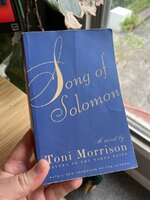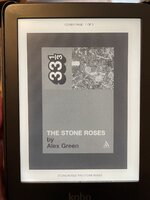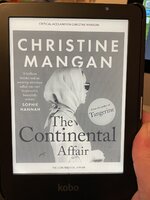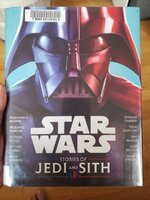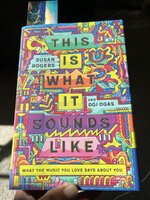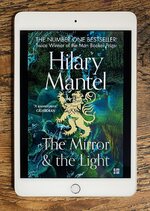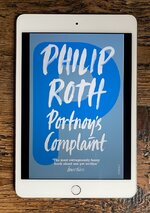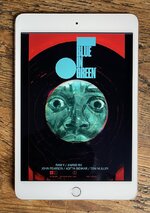Book 17: On Blue's Waters, by Gene Wolfe
View attachment 176252
Back on my bullshit! For those counting we're on book one of The Book of the Short Sun, and the tenth of Wolfe's Solar Cycle. Written in the first person by the third-person author of the Book of the Long Sun, we once again find ourselves wondering who is writing the book, why, and how have they changed between the events they're describing and the writing of said events? It's all typical Gene Wolfe fare, so of course I'm gobbling it up; the prose is better than Long Sun's, so I fell into this one very easily. There's also a deep undercurrent of middle-aged mourning to it.
Book 18: Flow my Tears, The Policeman Said; by Philip K. Dick
View attachment 176253
I don't know, man. I've read a grip of Dick before; this didn't bring me anything new, while also introducing me to a parade of really unpleasant characters. The premise: a megafamous singer and tv star wakes up one day to find nobody knows who he is. Dick must've been in his "hanging out and doing drugs" phase because many of the scenes are discussions that sound like people hanging out and doing drugs.
Book 19: Just Kids, by Patti Smith
View attachment 176254
Read this one in the wake of seeing Smith speak/sing on book tour last December and in anticipation of seeing her perform with a band in August. This was a good counterpoint to Please Kill Me, which imo did her dirty; lots of interviews where dudes write her off or sum her up as being really cool for having boobs.
This memoir mainly revolves around Smith's romantic and artistic relationship with the artist/photographer Robert Mapplethorpe. You can feel her love for him deeply in the prose, and while Smith clearly loves poets/poetry, her manner of writing is so simply direct. The lack of sentimentality helps cut right to the feeling.
Picking up this book, I feared I'd feel jealousy for the life of the young artist, or regret that I pivoted away from a life like that; instead I found something so specific to the author's experience and so universal in its feeling that I felt no grudge or chagrin. Just beautiful.
Book 20: Dawn, by Octavia Butler
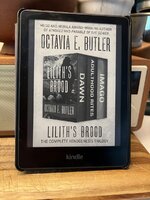
My first Butler! Concerns a woman woken from suspended animation by aliens who abducted her on the eve of a world-annihilating nuclear war. The aliens wish to repopulate Earth with humans, in exchange for a sort of genetic partnership (which I think pans out more over the next few books). Much of the book consists of conversations and two-person scenes. This was an excellent read, though it petered out a little bit near the end for me as a lot of the other revived human characters felt a bit thinly drawn and reactively cruel.
Book 21: In Green's Jungles, by Gene Wolfe
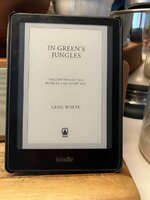
Gene really starts cooking with this one, and throws a lot at us. Much like Blue's Waters before this, more focus is put on the person writing the story you're reading, and their present circumstances; the journeys through Green's Jungles are obfuscated and barely referenced. In classic Gene style we get a storytelling contest in which each teller is giving away more about themselves than actually telling a story.
Book 22: Drive your Plow Over the Bones of the Dead, by Olga Tokarczuk
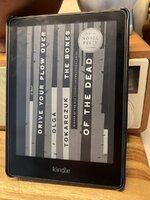
I liked this okay; this was a book club selection, and while a lot of people in the group found the narrator funny, I thought she was something of an out-there caricature. Funny enough, I spoiled the end of this book via the "themes" section of its wikipedia entry (the "themes" section doesn't typically contain explicit plot elements; I don't think that's my fault) and knowing how things would pan out actually pushed me to go ahead and complete the story.
Book 23: The Priory of the Orange Tree, by Samantha Shannon
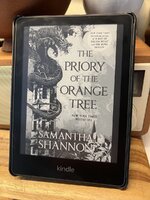
This one's a DNF; I kept seeing it on the bookstore shelves and thought "hmm a thick fantasy novel sounds pretty fun," and I don't engage with a lot of contemporary work in the genre. I couldn't hang with it, though; there's just too much telling and not enough showing. With every description of action or piece of dialogue to propel the story forward, the author throws in tons of worldbuilding facts. To use a metaphor, you don't know which facts will be "on the test," so you find yourself getting caught up in "will I need to remember the quantity and names of rulers in this kingdom?" rather than "what will happen next?"
On top of that, the story just. Doesn't. Move. I got about a third of the way through and while I could explain
the world to you, I couldn't really tell you what
the story was. Lots of goodreads reviews parrot this criticism, but also praise the slow-burn romance. After 1/3 of this book (that's over 200 pages of investment), I can't tell you whom is supposed to fall in love with whom.
Book 24: Return to the Whorl, by Gene Wolfe
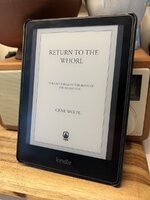
And with that I finish The Book of the Short Sun and Gene's twelve-book Solar Cycle. Was it an interesting, rewarding read? Yup! Was it surprisingly emotional for a book by an engineer who seems more focused on fucking with the reader than anything? Damn right! Do I fully understand it? Heck no!
The story finishes the saga of Horn, a man sent back to the Whorl (a generation ship) to retrieve his mentor and the government/religious leader Silk. Through the nature of Horn's journey, as well as the feeling of one going back to a home which has changed immensely, the story has this sadness which runs throughout; Wolfe nails his characters and their inner lives so well. After eleven previous books of Gene giving answers that generate questions and conclusions which imply we've only scratched the surface of the story, I'm happy to say Return to the Whorl has an actual, satisfying ending (while still remaining as elliptical as possible).
I'm very happy and satisfied to have reached the end of this cycle after ~16 months of going through what initially started as a New Sun reread. Now it's just a matter of time before I reread the whole cycle (as they say, one doesn't read Wolfe, they only reread).
